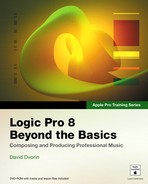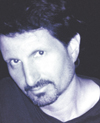Cameo: Scoring with Logic—Jeff Rona
FILM-SCORE COMPOSER JEFF RONA HAS BEEN using MIDI and digital audio to construct musical soundscapes for years. His credits include compositions for films and television projects directed by Robert Altman, Frank Darabont, Jonathan Demme, Stephen Hopkins, Mark Pellington, Ridley Scott, Steven Soderbergh, Steven Spielberg, Wong Kar-wai, and many others. His projects have received Oscar, Peabody, and Emmy awards as well as countless film festival awards around the world. He is a recipient of an ASCAP film and television music award.
He also produces albums, continuing a career that included a stint in trumpeter Jon Hassell’s pioneering world-music group, which often shared the stage with ambient/avant-garde rocker Brian Eno. (Rona co-composed and produced the group’s 1990 opus City: Works of Fiction.) His most recent album appearance is on Persian singer Azam Ali’s latest record, Elysium for the Brave.
At the heart of Rona’s musical efforts, for film and otherwise, is Logic Pro. “Everything happens in Logic,” he said.
Like any other film composer, Rona visualizes his project before he begins work, so he starts with a “spotting session,” often building a massive Logic project file that serves as a template for the entire film or TV episode. Before he composes a note, he roughs out the placement of each musical passage in the score and thinks through the appropriate musical style and approach to each.
As Rona explains in his book The Reel World: Composing for Film (based on his long-standing column, “The Reel World,” in Keyboard magazine), each film or TV project makes its own demands. Different projects, or even different scenes within a project, might call for the use of electronica, orchestral music, world beat, or any other musical genre; the key is to make sure the musical approach serves and supports what’s onscreen. “Film music,” Rona says, “is a collaboration between a group of artists sharing a single vision to tell a story.”
Eschewing paper and pencil to sketch out his ideas, Rona uses Logic’s arsenal of tools to generate his soundtracks from beginning to end. However, he still finds the Logic Pro’s Score Editor extremely important to his process. “It’s really helpful on complex music to look at notation,” he said. “As a compositional aid, the Score window is fantastic.”
Perhaps his favorite feature of Logic Pro 8 is its support for 5.1-channel surround sound buses, which allows him to work fully in surround sound without having to mock up huge “pseudo-surround” mixes—a process he described as painstaking and hardware intensive in previous versions of Logic Pro. “Now everything in the computer can be in surround, so it’s super easy,” he said. “Surround was good before, and now it’s great.”
Rona does most of his composition on three Macs synced via MIDI over his studio network. Each machine has its own audio interface outputting via digital Lightpipe to a Digidesign Pro Tools system, which he uses as the final destination for every track of his music.
One Mac serves as his primary Logic workstation, and another acts as an “EXS24 farm,” hosting dozens of EXS24 mkII sampler instruments that serve as his orchestra. “The signal flows digitally from one computer to another, and everything gets mixed and processed inside Logic,” Rona said. “I don’t use a speck of equipment outside Logic” other than his mic preamps, analogue converters, and a small digital mixer that functions as a volume knob.
Using Logic on tandem Macs has proved invaluable, not just for composition and production methods but also for presenting his work to clients. “When you score for film or TV, you deal with dozens of pieces of music that have to be presented to a director or producer,” Rona said. “The flow of those meetings is critical; it must be flawless. The way the music is presented is almost as important as the music itself. Running Logic on two computers, one of which is in essence the orchestra, saves a lot of time.”
Rona’s number one tip to fellow Logic users? “Make generic sounds feel ‘ungeneric.’” Rona almost never uses standard presets in Logic and says he generally avoids “anything that anyone else has created.” He tweaks Logic effects settings and applies “lots of freebie plug-ins” until every cue and passage sounds unique—and appropriate for the project at hand. “If you’re using so many effects that the computer gets sluggish, just freeze the track” and continue, he advises. “Don’t let technology dictate your musical creativity.”
On a related note, Rona recommends compiling and cataloging the fruits of your tweaking. “Whenever you create a sound you really like, immediately save it as a channel strip, especially when the sound is a complex combination of synth or sample and multiple effects.” A good library of channel strips, even if you change them in the future—as you will (and should), according to Rona—can save lots of time.

